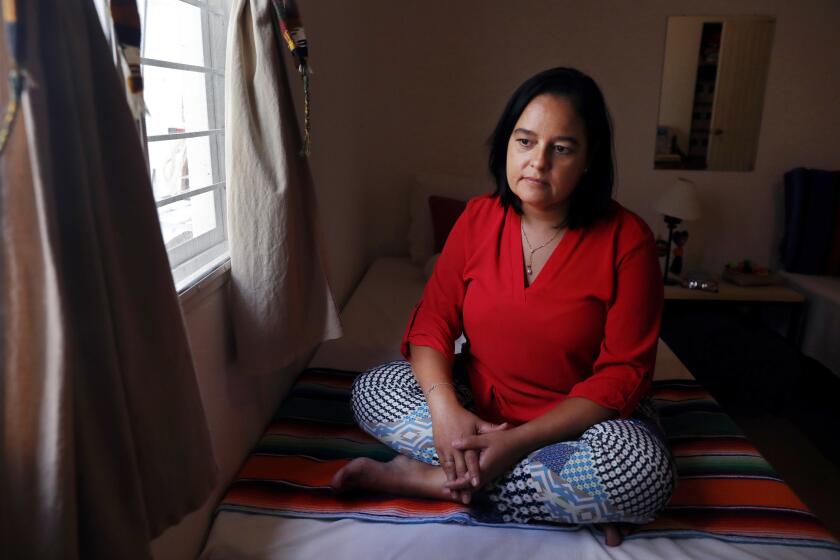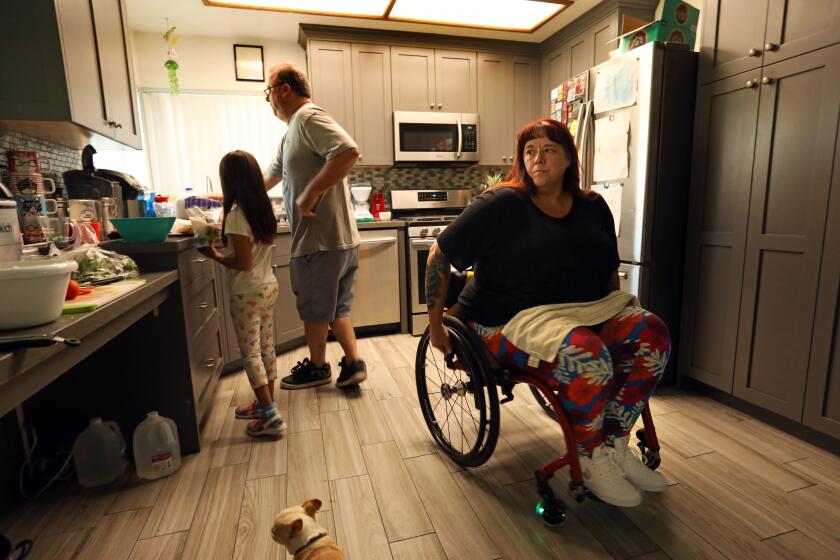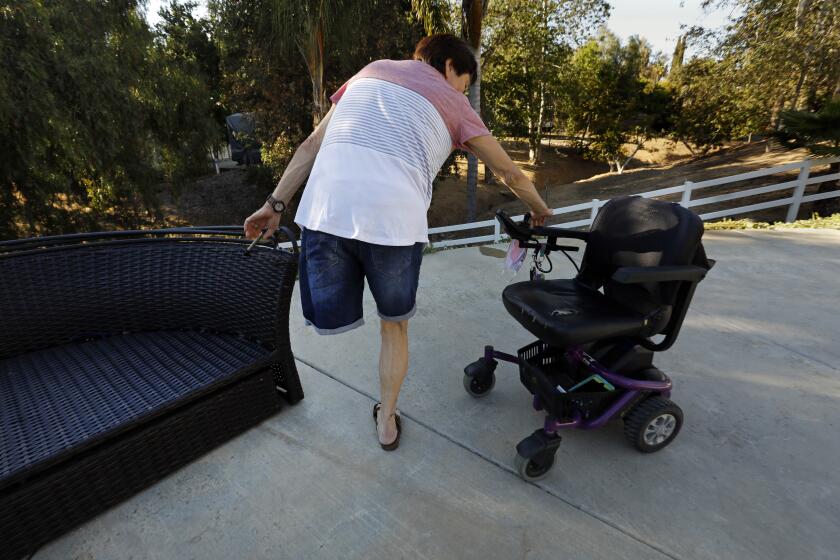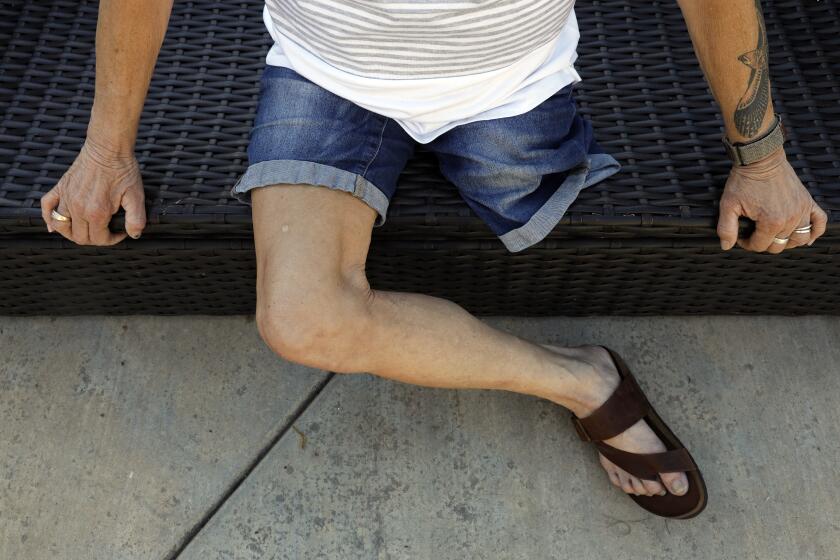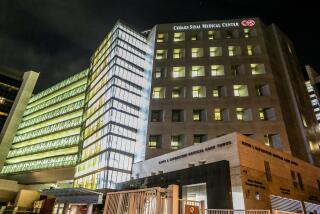A doctor was charged with sexual assault. The Medical Board didn’t suspend his license

- Share via
Two weeks before Christmas in 2019, an emergency room nurse at Cedars-Sinai Medical Center in Los Angeles joined one of her colleagues, Dr. Anshul Gandhi, for a drink after work.
She took the invitation as a friendly gesture and thought that “building bridges between doctors and nurses was good for morale,” according to a civil lawsuit she later filed against him.
But instead of sharing a little holiday cheer, Gandhi drugged her at a bar, followed her home and sexually assaulted her, the lawsuit alleges.
Three other women from Cedars came forward with similar allegations about the emergency room physician, eventually leading prosecutors to charge him with felony sexual battery of four women, according to court documents. Some of the original criminal charges against Gandhi have been dismissed or reduced. He now faces two felony counts of sexual battery. He has pleaded not guilty.
After Gandhi, 35, was charged, lawyers for the Medical Board of California, which regulates doctors, called him an “extreme danger to the public” and could have moved to suspend his license. Instead, they convinced the judge to prohibit Gandhi from practicing as a condition of his bail. The board’s procedures to quickly suspend a medical license in such circumstances are too complex and expensive, they argued in one court filing.
The California Medical Board has reinstated a number of doctors who sexually abused patients, a Times investigation found.
But what at first seemed like a winning tactic for the Medical Board now appears to have unraveled after another judge recently agreed with Gandhi’s attorneys that it is the board’s job, not the court’s, to determine if doctors are qualified to see patients.
In November, the court lifted its restrictions and Gandhi became eligible to practice as he awaits trial. Any reference to the court order and criminal case stemming from the alleged sexual abuse has been scrubbed from his profile on the board’s website. His attorney said he is not currently seeing patients but is looking for work.
Gandhi’s case is the latest to raise serious questions about the panel’s ability to bar a doctor it determines is dangerous from seeing patients and highlights significant gaps in its oversight.
“The scary part is that there’s nothing on the Medical Board’s website about this doctor,” said Marian Hollingsworth, co-founder of the Patient Safety League, an advocacy group. “If the information isn’t there, [the board is] failing in their job to protect patients. That’s what bothers me.”
A Cedars-Sinai spokesperson declined to comment on pending litigation, but said Gandhi had provided services at the hospital as a contract physician and resigned in January 2020.
The Medical Board declined to comment on Gandhi’s case, as it does in all pending disciplinary actions, noting that complaints and investigations are confidential by law. A spokesperson for the board said it was required by law to remove references to the initial court order restricting his practice once the second judge lifted it.
Board officials could not point to anything in state law that prohibits them from informing patients of pending criminal charges against doctors. But Carlos Villatoro, another spokesperson for the board, maintained it can’t post such information unless it is mandated to do so, which would require changes to the Business and Professions Code.
The board has long battled allegations by patients, consumer advocates and others that it goes easy on bad doctors and fails to protect patients.
Serious malpractice leading to the loss of limbs, paralysis and the deaths of patients wasn’t enough for the California Medical Board to stop these bad doctors from continuing to practice medicine.
A Times investigation earlier this month found that since 2013 the board reinstated 10 physicians who had lost their licenses for sexual misconduct. They included two doctors who abused teenage girls and one who beat two female patients when they reported him for sexually exploiting them.
In July, The Times found the board had consistently allowed doctors accused of negligence to keep practicing and harming patients, leaving them dead, paralyzed, brain-damaged and missing limbs.
In previous interviews, board President Kristina Lawson has defended the panel as “dedicated and committed to protecting California consumers,” while acknowledging that it has “room for improvement.” But she also said the board is bound by rules and regulations that complicate putting bad doctors out of business.
“We have to operate within the confines of the law,” she said.
The emergency room nurse who sued Gandhi, identified in the lawsuit as Jane Doe, also filed a complaint with the Medical Board and reported the incident to Los Angeles police. Besides the sexual assault, the lawsuit also alleges Gandhi took a nude photo of her while she was passed out and posted it on social media. He has denied her allegations and the charge related to her has been dismissed from the criminal case. Her civil lawsuit is pending.
One of Gandhi’s subsequent accusers, another ER nurse, became acquainted with him on a hike and later accepted his invitation to have drinks at a bar and then go to his house to watch a movie in July 2018, according to a board investigator’s declaration in court records. She alleges Gandhi “slipped something into the drink” there and when she awoke he was on top of her, masturbating.
Another hospital employee told a Medical Board investigator that she was at a 2016 holiday party that Gandhi also attended. At some point she passed out and woke up at Gandhi’s home, pinned beneath him as he masturbated, according to the declaration submitted as part of bail proceedings.
Yet another co-worker alleged that he “jumped on top of her” and masturbated after they returned to his home to watch television following a “happy hour function after work” and drinks at a bar in 2016, the declaration states.
Reached by phone, Gandhi referred questions to his criminal defense attorney, Michael Kraut, who declined to comment.
Michael Khouri, Gandhi’s lawyer in the civil suit and Medical Board matters, said he could not comment on the specifics of the criminal case. But he said all of Gandhi’s sexual encounters were consensual, referring to his accusers as “so-called victims.”
“Of course, we contend they are not victims,” Khouri said. “Our contention is that he has no liability to the plaintiff in the civil case. I can say that we believe he is innocent of the charges in the criminal case.”
Khouri said that Gandhi’s accusers are lying, motivated by “money and the scorn of rejection” and that their claims of being drugged are “fantasy.”
Gandhi’s accusers in the criminal case are not identified by name.
Christopher Grivakes, the attorney for Jane Doe in the pending civil suit, called Khouri’s characterization of the women “offensive” and said his client is “a very credible witness.”
“It is horrible what happened to her,” he said. “The reason we have a jury system is for people to find out who is telling the truth. I am confident that when we get to a jury, Jane Doe will be believed.”
The Times has confirmed Jane Doe’s identity but does not routinely name alleged victims of sexual abuse.
Khouri said Gandhi has not resumed practice “but is able to, obviously, and is in the process of looking for a suitable position.”
After Gandhi was charged, lawyers for the Medical Board acknowledged in court papers it could have sought to prevent him from practicing through an interim suspension order or a temporary restraining order. But they argued that the court could move more quickly and efficiently.
“The public would be in immediate danger” if the judge did not act, the board’s lawyers wrote in August 2020 for the bail proceeding. The judge agreed and in September 2020 ordered Gandhi to stop practicing pending the outcome of the criminal case.
In its court filings, the board explained it was not privy to all the evidence it would need to prove an administrative disciplinary charge, and that to do so would require the state to “expend scarce public resources in two different forums” to achieve the same result of keeping Gandhi from treating patients.
Under current state regulations, if the board files an interim suspension order against a doctor who is charged criminally, it must offer the physician a timely hearing, which would almost certainly happen before the trial.
Some doctors simply accept the suspension to avoid testifying and the possibility of getting caught in a lie or otherwise incriminating themselves. But if the doctor insisted on a hearing, the board would need to present substantially the same evidence, and witnesses, involved in the criminal case.
And if it failed to prove the merits of a disciplinary action to an administrative law judge, that could jeopardize the criminal case because defense attorneys could argue that the issue had already been litigated, board lawyers said in court records.
Resources are available, but checking your doctor’s track record can be difficult. Here are some tips.
Matthew Magner, a former Kern County deputy district attorney who prosecuted doctors, said the Medical Board appears to be “hamstrung by their own policies and procedures.”
Most prosecutors would welcome the chance to watch the doctor testify at a board hearing, Magner said, but they would be reluctant to allow their own witnesses to give statements. So most would prefer the judge to simply forbid the doctor from practicing as a condition of bail.
Securing the court-ordered restrictions achieved the board’s goal of putting Gandhi out of business and prompted the Texas Medical Board to suspend his license there.
That kept Gandhi from practicing for a little more than a year, until last month, when his lawyers convinced a different judge on the case to lift the previous order.
Gandhi’s lawyers contended that he was not a danger to the public and did not have access to controlled substances as an emergency room doctor. They also said that the Medical Board’s view “sensationalizes the facts of the case,” and that the accusations are not related to his practice of medicine.
“Accordingly, this case is not about Dr. Gandhi’s conduct as a physician but about alleged encounters that occurred outside the hospital setting,” they said in court papers.
Los Angeles County Superior Court Judge Deborah Brazil granted the defense motion to lift his medical restrictions on Nov. 19, court records show, and did not impose other conditions requested by the Medical Board and prosecutors, including that Gandhi have a chaperone when treating patients.
The state attorney general’s office, which represents the Medical Board in court, declined to comment.
It’s not unheard of for doctors’ licenses to remain valid even after they’ve been charged with serious crimes.
San Diego spinal surgeon Lokesh Tantuwaya’s license remained active for years after he was indicted in 2018 for allegedly accepting millions in bribes to perform surgeries at a hospital whose owner illegally overbilled insurers for the hardware inserted into patients’ backs. Several of Tantuwaya’s patients sued him for malpractice, including a woman who alleged her routine back surgery was botched so badly her leg had to be amputated.
San Diego spinal surgeon Lokesh Tantuwaya was indicted by the feds for fraud and is in jail awaiting trial. But his medical license is still active.
Despite the federal indictment — and Tantuwaya’s long history of being put on probation by the Medical Board for previous cases, including domestic violence, gross negligence, and dishonesty — his license remained valid until a few months ago when he failed to pay the renewal fee.
He pleaded not guilty to the federal charges and is currently in jail awaiting trial.
In Gandhi’s case, nothing in the public record indicates that the Medical Board has taken further action since the restrictions were lifted.
A previous notice of the court order restricting his practice has disappeared from the board’s online license lookup, a valuable tool for patients seeking to vet doctors.
In emailed responses to The Times, a spokesperson for the board said state law mandates that a suspension order “must be deleted from the [doctor’s] profile if the restriction is lifted or if an administrative decision becomes effective” — even if that means leaving patients in the dark about pending criminal charges.
“For the Board to leave the suspension order on the website indefinitely, the Legislature would need to change the law mentioned above,” spokesperson Emmalee Ross said in the email.
The board also renewed Gandhi’s license for another two years on Nov. 12 through its online portal. He met all requirements and the board “does not have the authority to deny licensure based on unproven criminal or administrative court charges,” Ross said.
But she noted that the court’s restrictions were still in place at the time.
“At the point that Dr. Gandhi renewed, he was still subject to the court-ordered restriction and was not allowed to practice medicine in California,” she said.
Times staff writer Melody Gutierrez contributed to this report.
More to Read
Sign up for Essential California
The most important California stories and recommendations in your inbox every morning.
You may occasionally receive promotional content from the Los Angeles Times.
